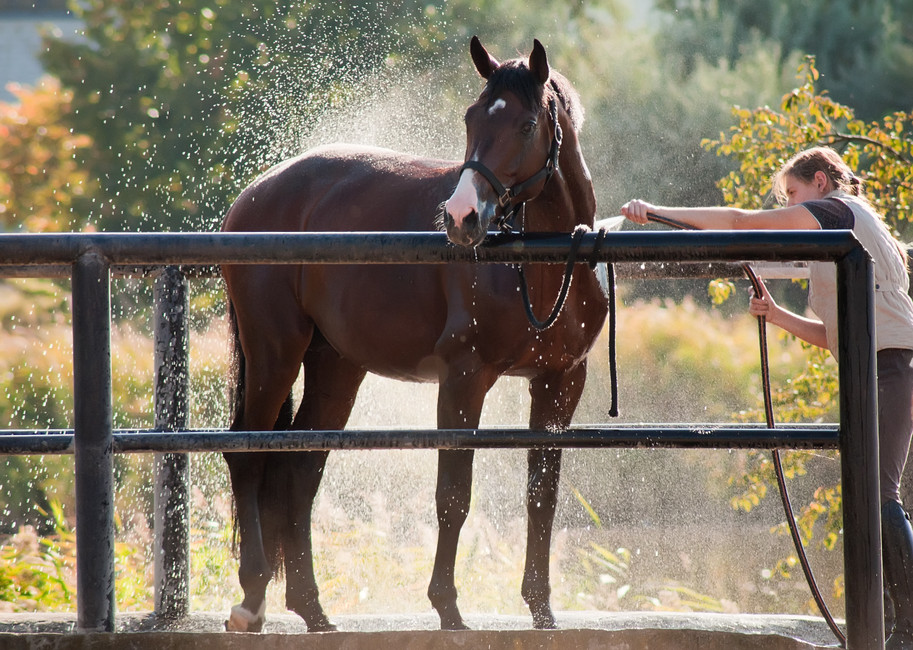
What You Need to Know About Equine Skin Health
A healthy, shiny coat, while not the most important factor when showing or competing, will always catch the judges' eyes. It is also a sign of good equine health in the largest, most visible organ - the skin.
Skin health is sometimes overlooked; however, it is clear when things are not going well. Bumps, irritation, swelling, rashes and infections are all signs of compromised equine skin health.
Luckily, there are many ways to prevent and address common skin conditions in your horse.
Read on to learn the basics of good skin health, the types of common infections, and our favorite tips for keeping your horses' skin in tip-top shape.
A Healthy Coat Starts From Within
We all know healthy skin and therefore a healthy coat starts from within. Horses with gleaming coats tend to consume balanced diets and have lifestyles that promote a healthy skin and coat. A balanced diet rich in can help promote that healthy shine from inside out. Holistic Horse has a great resource about the benefits of omega fatty acids for your horse. Outdoor exercise with exposure to the sun for vitamin D is important along with regular grooming. A few factors that can negatively impact skin health include: excess stress, competitions, frequent clippings and a lack of grooming.
During the spring, mud is a factor in equine skin health. According to Equus Magazine, little bit of mud can be a good thing. Mud in small doses keeps hooves from becoming dry and contracted. Mud can even be beneficial for skin health – protecting horses from insects and encouraging natural oil production.
 Too much mud, however, can lead to scratches, pulled tendons, bacterial and fungal skin infections and even lost shoes. The rule of thumb is to avoid mud so deep your horses' hooves are completely covered and persists at that level for over three days.
Too much mud, however, can lead to scratches, pulled tendons, bacterial and fungal skin infections and even lost shoes. The rule of thumb is to avoid mud so deep your horses' hooves are completely covered and persists at that level for over three days.
Keep your horses' skin clean and dry, and use a gentle SLS-free shampoo, like our Sore No-More Massage Shampoo, if your horse gets too muddy. For more information about choosing the right shampoo for your horse, check out this piece from the Arenus blog.
Digestive health and poor nutrition are other factors to consider. Proper digestion can help support a gleaming coat. If your horse struggles with a poor coat and digestion, consider a high-quality digestive aid, such as Assure Guard Gold, along with looking into the quality of your horses' feed.
Additionally, a quality vitamin-mineral balancer, like Eq-Well, can help support a healthy coat with omega-three fatty acids and natural vitamin E. Our on-staff equine nutritionist, Brady Karren, offers free consultations (sign up here) for those seeking customized advice about their horses' nutrition.
Common Skin Conditions
A healthy skin and coat helps protect your horse from the elements. The horse's hair shields your horse from damaging UV rays, weather and helps keep him warm. A healthy coat can help prevent inflammation, skin infections and even allergens from penetrating deeper layers of skin.
Below are a few common equine skin conditions, and a great video from the ambulatory vets at Colorado State University:
- Sweet Itch: Also known as Summer's Itch, Sweet Itch is an allergic response to a small flying insect called the Culicoides midge. Sweet Itch causes mild to sever itching, bald patches, and is common in warmer regions and found in horses of all ages.
- Rain Rot: Also called Rain Scald, Rain Rot is a common skin infection caused by bacteria. It is often mistaken for a fungal infection, and causes large, crusty scabs.
- Ringworm: Ringworm is a fungal dermatitis or fungal infection. It is highly contagious and can spread from horse to human (or human to horse).
- Dandruff: Dandruff in horses is a form of eczema that leads to small, dry flaky crusts forming at the main or tale. This condition can be lifelong for horses prone to it.
- Mange: Mange is caused by an infestation of Demodex equi or D. caballi. Demodex mites infest hair follicles and sebaceous glands. Although rare in horses, it can cause hair loss and scaling.
- Dermatitis: Dermatitis can be caused by an allergic reaction, bacterial or fungal infection. It results in skin inflammation, bumps, irritation and itching. The best treatment depends on the cause of the dermatitis.
Grooming & Skincare Tips
Good nutrition, exercise, sunlight and high-quality supplements can make a world of difference for your horse's skin health. That said, regular grooming and quality skincare topicals are equally essential.
Harsh topical products that contain sodium lauryl sulfate can strip the skin, leaving it dry and dull. Sore No-More Massage Shampoo is SLS-free, and contains gentle cleansing agents, coconut oil and essential oils for even the most sensitive skinned horse (or dog!).
Performance horses need extra care when it comes to their skin. The stress of heavy workouts plus show grooming practices like clipping, daily washing, irritating topicals and excessive brushing can make these horses extra prone to skin issues.
Practice gentle but routine grooming for your performance horse and be sure to use products that are formulated without harsh irritants. The Sore No-More Performance Ultra line offers unbeatable pain and inflammation relief without harsh, drying irritants like menthol and alcohol.


